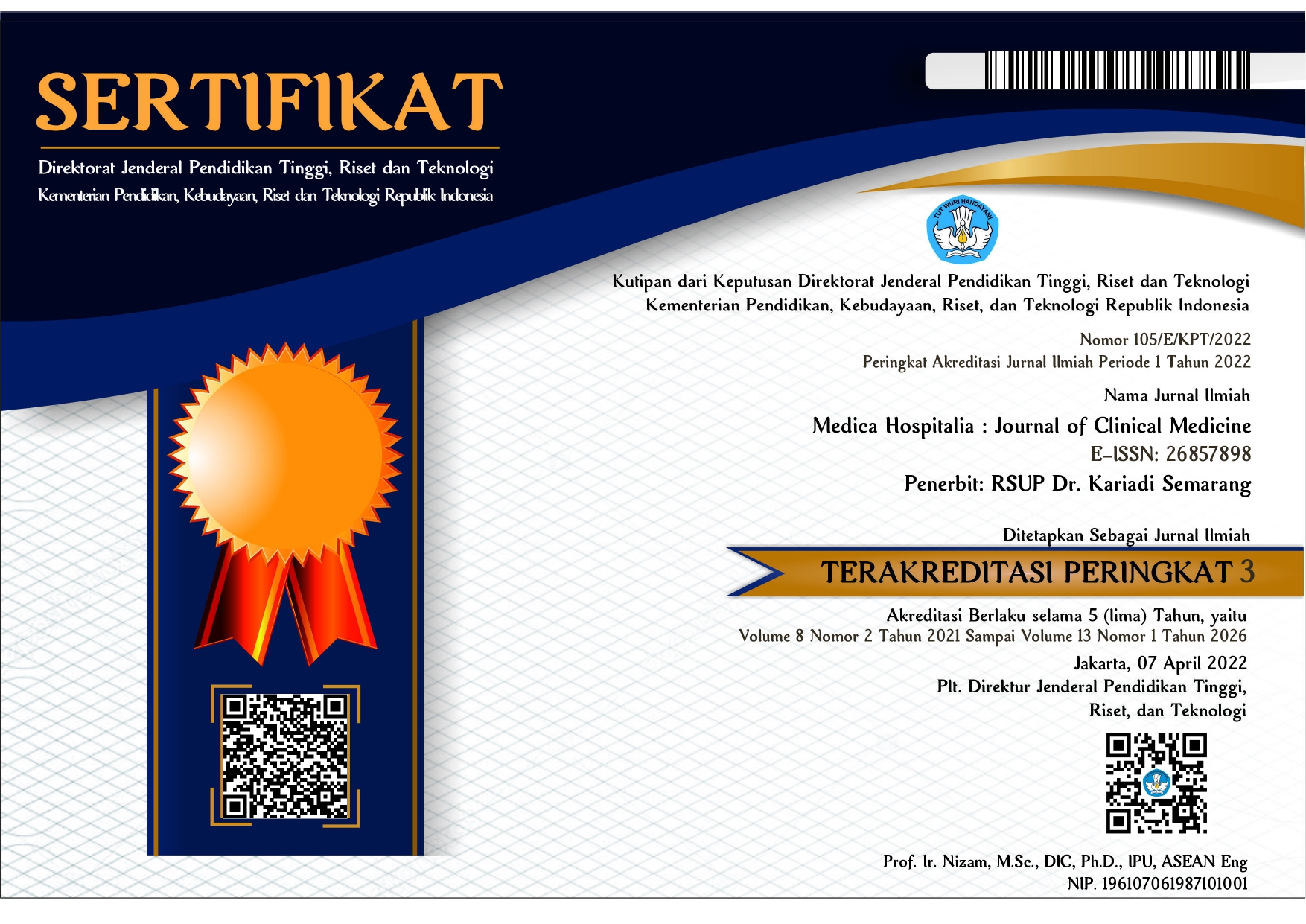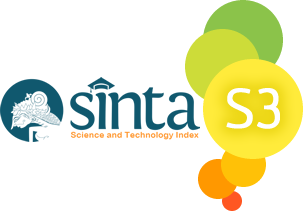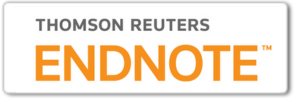In-Hospital Major Adverse Cardiovascular Events in Patients with STEMI during COVID-19 Pandemic
DOI:
https://doi.org/10.36408/mhjcm.v10i1.852Keywords:
ST-segment elevation myocardial infarction, COVID-19 pandemic, total ischaemic time, management, major adverse cardiac eventAbstract
BACKGROUND: The Coronavirus Disease 2019 (COVID-19) pandemic has become a global burden, changing healthcare system and affecting patients with ST segment elevation myocardial infarction (STEMI). Several countries reported a decrease in hospital admission, changing management, increase total ischemic time, and major cardiovascular events (MACE) in the pandemic era. However, there is limited data especially in Indonesia.
OBJECTIVE: To know the differences in admissions, characteristics, management and in-hospital MACE in STEMI patients between pre and pandemic era.
METHODS: Comparative observational analytical study was done on 169 patients in the pre-pandemic (12 March 2019-11 March 2020) compared to 163 patients in the pandemic era (12 March 2020-30 September 2021) with STEMI at dr. Kariadi Semarang Hospital. Assessment of monthly admission rates, total ischaemic time, reperfusion management, COVID-19 status and MACE were carried out.
RESULTS: During the COVID-19 pandemic, there was a decrease in the average admission of 14.1 to 8.6 patients per month (p<0.001), increase total ischaemic time of 8.78 (3.22-19.68) hours to 10.22 (3 .20-20.43) hours (p<0.001), decreased use of primary PCI (97.0% vs. 83.4%, p<0.001), increased fibrinolytic (1.8% vs8.6%,p=0.010) and no reperfusion (1.2%vs8.0%, p=0.007). There was a significant increase in MACE in the era of the COVID-19 pandemic (10.7%vs22.1%,p=0.008), with mortality (4.7%vs11.7%,p=0.035), stroke (1.2%vs1.8%,p=0.680), cardiogenic shock (4.1%vs11.0%, p=0.030), and acute pulmonary edema (3.6%vs10.4%,p=0.024).
CONCLUSION: There was a decrease in admissions and primary PCI procedure, increase use of fibrinolytics and without reperfusion, total ischemic time prolongation, and significant increase of in-hospital MACE in STEMI patients during the COVID-19 pandemic.
Downloads
References
- Zhang F, Song X, Dang Y. Experience of ST segment elevation myocardial infarction management during COVID-19 pandemic from the mainland of China. Cardiovasc Revascularization Med. 2020;(xxxx).
- Mafham MM, Spata E, Goldacre R, Gair D, Curnow P, Bray M, et al. COVID-19 pandemic and admission rates for and management of acute coronary syndromes in England. Lancet. 2020;396(10248):381–9.
- Metzler B, Siostrzonek P, Binder RK, Bauer A, Reinstadler SJ. Decline of acute coronary syndrome admissions in Austria since the outbreak of COVID-19: The pandemic response causes cardiac collateral damage. Eur Heart J. 2020;41(19):1852–3.
- Haberman R, Axelrad J, Chen A, Castillo R, Yan D, Izmirly P, et al. Reduced Rate of Hospital Admissions for ACS during Covid-19 Outbreak in Northern Italy. N Engl J Med. 2020;383(1):85–8.
- Pessoa-Amorim G, Camm CF, Gajendragadkar P, Maria GL De, Arsac C, Laroche C, et al. Admission of patients with STEMI since the outbreak of the COVID-19 pandemic: A survey by the european society of cardiology. Eur Heart J - Qual Care Clin Outcomes. 2020;6(3):210–6.
- Wilson SJ, Connolly MJ, Elghamry Z, Cosgrove C, Firoozi S, Lim P, et al. Effect of the COVID-19 Pandemic on ST-Segment-Elevation Myocardial Infarction Presentations and In-Hospital Outcomes. Circ Cardiovasc Interv. 2020;13(7):1–3.
- Firman D, Mangkuanom AS, Iryuza N, Fahri I, Artha IMJR, Mulia E, et al. Decrease in the Number of Patients Presenting With ST-Segment Elevation Myocardial Infarction Across Catheterization Centers in Indonesia During the Coronavirus Disease 2019 Pandemic. Front Cardiovasc Med. 2021;8(August).
- Coughlan JJ, Chongprasertpon N, Arockiam S, Arnous S, Kiernan TJ. COVID-19 and STEMI: A snapshot analysis of presentation patterns during a pandemic. IJC Hear Vasc. 2020;30(xxxx):4–6.
- Trabattoni D, Montorsi P, Merlino L. Late STEMI and NSTEMI Patients’ Emergency Calling in COVID-19 Outbreak. Can J Cardiol. 2020;36(7):1161.e7-1161.e8.
- Soylu K, Coksevim M, Yanık A, Bugra Cerik I, Aksan G. Effect of Covid-19 pandemic process on STEMI patients timeline. Int J Clin Pract. 2021;75(5):1–6.
- Reinstadler SJ, Reindl M, Lechner I, Holzknecht M, Tiller C, Roithinger FX, et al. Effect of the COVID-19 pandemic on treatment delays in patients with st-segment elevation myocardial infarction. J Clin Med. 2020;9(7):1–10.
- Zhu Y, Xing W, Wang H, Song J, Sun Z, Li X. Characteristics of patients with ST-segment elevated myocardial infarction (STEMI) at the initial stage of the COVID-19 pandemic: a systematic review and meta-analysis. Infect Dis (Auckl). 2021;53(11):865–75.
- Dingcheng Xiang, Xin Xiang, Wei Zhang, Shaodong Yi JZ. Management and Outcomes of Patients With STEMI During the COVID-19 Pandemic in China. J Am Coll Cardiol. 2020;76(January).
- Ibanez B, James S, Agewall S, Antunes MJ, Bucciarelli-Ducci C, Bueno H, et al. 2017 ESC Guidelines for the management of acute myocardial infarction in patients presenting with ST-segment elevation. Eur Heart J. 2018;39(2):119–77.
- Neil R, Vasileios P. The missing acute coronary syndromes in the COVID-19 era. Ther Adv Cardiovasc Dis. 2020;14(6):1–5.
- Ashraf S, Ilyas S, Alraies MC. Acute coronary syndrome in the time of the COVID-19 pandemic. Eur Heart J. 2020;41(22):2089–91.
- Arnett DK, Blumenthal RS, Albert MA, Buroker AB, Goldberger ZD, Hahn EJ, et al. 2019 ACC/AHA Guideline on the Primary Prevention of Cardiovascular Disease: A Report of the American College of Cardiology/American Heart Association Task Force on Clinical Practice Guidelines. Vol. 140, Circulation. 2019. 596–646 p.
- Chi JS, Kloner RA. Stress and myocardial infarction. Heart. 2003;89(5):475–6.
- De Luca G, Algowhary M, Uguz B, Oliveira DC, Ganyukov V, Zimbakov Z, et al. COVID-19 pandemic, mechanical reperfusion and 30-day mortality in ST elevation myocardial infarction. Heart. 2022;108(6):458–66.
- De Luca G, Verdoia M, Cercek M, Jensen LO, Vavlukis M, Calmac L, et al. Impact of COVID-19 Pandemic on Mechanical Reperfusion for Patients With STEMI. J Am Coll Cardiol. 2020;76(20):2321–30.
- Erlina B, Agus Dwi S, Sally A N, Eka G, Isman F, Anwar S, et al. Protokol Tatalaksana Covid-19 Edisi 1 April 2020. 2020;26–7.
- Daniele A, Elena A, Emanuele B, Antonio L, Baumbach A, Elijah B. ESC Guidance for the Diagnosis and Management of CV Disease during the COVID-19 Pandemic. Eur Heart J. 2020;1–115.
- Firdaus I, Sukmawan R, Santoso A, Juzar DA. Panduan Diagnosis dan Tatalaksana Penyakit Kardiovaskular pada Pandemi COVID-19. 2020;1–117.
- Ng S, Juzar DA. Tantangan Penatalaksanaan STEMI di Pandemi Covid-19. Indones J Cardiol. 2020;41(2):92–7.
- Rodriguez-Leor O, Cid-Alvarez B, Ojeda S, Martin-Moreiras J, Ramon Rumoroso J, Lopez-Palop R, et al. Impact of the COVID-19 pandemic on interventional cardiology activity in Spain. REC Interv Cardiol. 2020;2(2):82–9.
- Chew NWS, Ow ZGW, Teo VXY, Heng RRY, Ng CH, Lee CH, et al. The Global Effect of the COVID-19 Pandemic on STEMI Care: A Systematic Review and Meta-analysis. Can J Cardiol. 2021;37(9):1450–9.
Additional Files
Published
How to Cite
Issue
Section
Citation Check
License
Copyright (c) 2023 Arjatya Pramadita Mangkoesoebroto, Yan Herry, Sefri Noventi Sofia, Bahrudin Bahrudin

This work is licensed under a Creative Commons Attribution-ShareAlike 4.0 International License.
Copyrights Notice
Copyrights:
Researchers publishing manuscrips at Medica Hospitalis: Journal of Clinical Medicine agree with regulations as follow:
Copyrights of each article belong to researchers, and it is likewise the patent rights
Researchers admit that Medica Hospitalia: Journal of Clinical Medicine has the right of first publication
Researchers may submit manuscripts separately, manage non exclusive distribution of published manuscripts into other versions (such as: being sent to researchers’ institutional repository, publication in the books, etc), admitting that manuscripts have been firstly published at Medica Hospitalia: Journal of Clinical Medicine
License:
Medica Hospitalia: Journal of Clinical Medicine is disseminated based on provisions of Creative Common Attribution-Share Alike 4.0 Internasional It allows individuals to duplicate and disseminate manuscripts in any formats, to alter, compose and make derivatives of manuscripts for any purpose. You are not allowed to use manuscripts for commercial purposes. You should properly acknowledge, reference links, and state that alterations have been made. You can do so in proper ways, but it does not hint that the licensors support you or your usage.

























